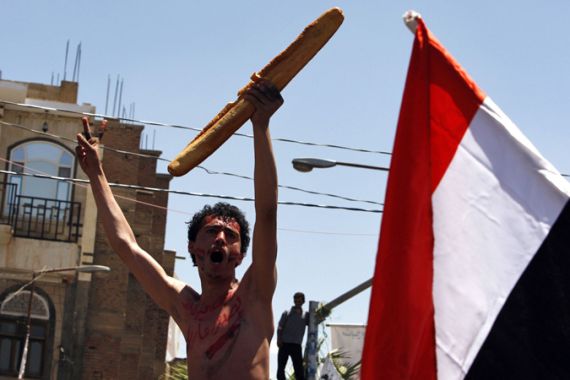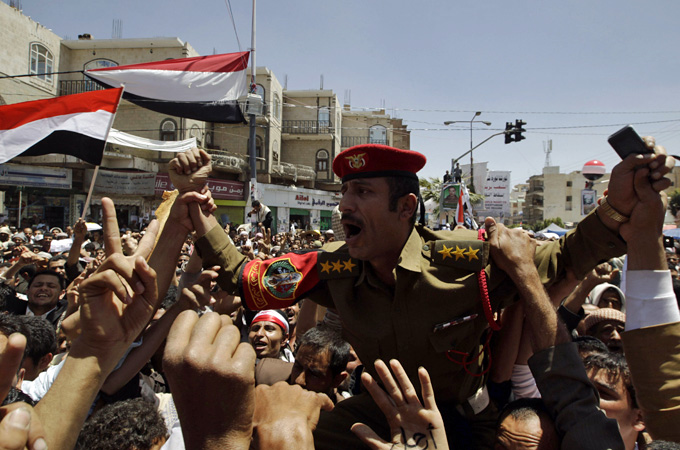Yemeni president offers early elections
Saleh offers parliamenatry and presidential polls before the end of this year in bid to appease protesters.

 |
| Army officers, ministers and diplomats have defected to the opposition movement [Reuters] |
Yemen’s president has offered to hold parliamentary and presidential elections before the end of the year, in his latest attempt to appease protesters calling on him to step down.
“At this historic moment Yemen needs wisdom to avoid slipping into violence … that would destroy gains and leave the country facing a dangerous fate,” Ali Abdullah Saleh said in a letter passed to opposition groups on Wednesday.
The letter contained a proposal to hold a referendum on a new constitution, then a parliamentary election to be followed by a presidential poll before the end of 2011.
Opposition groups, which had earlier called for massive rallies in the capital Sanaa on Friday to force Saleh from power, said they were studying the offer.
Saleh sacked his cabinet and declared a state of emergency which parliament rubber stamped on Wednesday for a 30-day period. The move was rejected by the opposition groups, which called on protesters to march on Saleh’s palace.
| Related |
|
|
“Friday will be the ‘Friday of the March Forward’, with hundreds of thousands of people… We will arrive where you are and we will remove you,” opposition spokesman Mohamed Qahtan told Al Jazeera.
Parliamentary officials said more than 160 MPs out of 164 who attended a special session voted for the step, which the president announced on Friday, hours after security forces gunned down more than 40 protesters near Sanaa university.
But Abdul Razaq al-Hajri of the powerful opposition Al-Islah party told AFP news agency that the turnout figure was fudged and that only 133 members attended.
Before the vote, the two-month-old protest movement warned of dire consequences.
“A vote in favour is equivalent to approving the massacre of the innocent,” demonstrators camped at a square near Sanaa University since February 21 said.
Nearly 3,000 gathered outside the university, and some painted their body in the red, white and black colours of the national flag, as they voiced their opposition to the law.
Defections including generals, tribal leaders, diplomats and ministers gained momentum after gunmen loyal to Saleh opened fire on protesters on Friday, killing 52 people.
UK pulls out staff embassy
The opposition call for massive protest on Friday triggered the British embassy to temporarily withdraw part of its embassy team from Sanaa because of the rapidly deteriorating security situation. Only a small core staff would remain, the Foreign Office said.
Meanwhile, US Defence Secretary Robert Gates said it was too soon to determine the outcome of the political turmoil in Yemen and said Washington had not planned for an era without Saleh in office.
“I think things are obviously, or evidently, very unsettled in Yemen. I think it’s too soon to call an outcome. We’ve had a good working relationship with President Saleh. He’s been an important ally in the counter-terrorism arena,” Gates said, speaking in Cairo.
“But clearly there’s a lot of unhappiness inside Yemen. And I think we will basically just continue to watch the situation. We haven’t done any post-Saleh planning,” he said.
Also on Wednesday, Yemeni authorities closed down the offices of Al Jazeera in Sanaa and withdrew the press accreditation of all Al Jazeera staff in the country.
Yemen, which has accused Al Jazeera of bias in favour of the demonstrators, last Saturday ordered two Al Jazeera correspondents to leave the country, saying they were working illegally and had acted unprofessionally.
